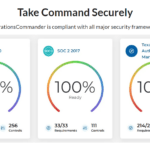Parking Enforcement with Digital Tickets and Virtual Chalking

Digital parking tickets have revolutionized parking enforcement, providing efficient, streamlined solutions for municipalities, universities, and private organizations.
The shift from traditional paper tickets to digital solutions brings reduced operational costs, improved accuracy, and environmental sustainability. Systems like OperationsCommander (OPSCOM), a comprehensive parking and security management software, are helping organizations implement these digital tools easily and reliably.
What is a Digital Parking Ticket?
A digital parking ticket is an electronically issued citation recorded and managed within a parking enforcement system. Unlike paper-based tickets that are easily misplaced or damaged, digital citations are securely stored, reducing administrative burden and allowing for faster processing. OPS-COM, for example, offers digital ticketing as part of its suite, enabling authorities to issue, track, and manage violations more effectively.
The Role of Digital Parking Tickets in Modern Parking Enforcement Software
Parking enforcement software integrates digital ticketing to simplify the ticketing process. With systems like OPS-COM, enforcement officers can issue and track citations in real-time, reducing the need for manual paperwork. OPS-COM’s platform provides mobile access, allowing officers to issue tickets on the go, update records, and improve reporting accuracy—critical factors for modern parking operations.
How Digital Parking Tickets Work
Digital parking tickets are issued through mobile devices, allowing officers to enter citation details directly into the system. These systems often incorporate License Plate Recognition (LPR) technology, which helps validate the vehicle’s license plate in real-time.
OPS-COM, for instance, integrates LPR to streamline the process, ensuring that ticket issuance is accurate and data is immediately updated. Many digital systems, including OPS-COM, now include virtual chalking technology, enabling officers to digitally mark a vehicle’s location without physically interacting. This feature is especially valuable for time-limited parking areas and helps enhance enforcement capabilities.
Benefits of Digital Parking Tickets
- Increased Efficiency
Digital ticketing systems allow enforcement officers to issue and process tickets faster. By updating records in real-time, systems like OPS-COM save time and improve efficiency, freeing up officers to cover more ground and focus on other enforcement aspects. - Environmental Impact
Moving to a digital system reduces the use of paper, ink, and other resources associated with traditional ticketing. This makes digital parking enforcement more sustainable, with each ticket issued through OPS-COM and similar systems avoiding the waste associated with printed tickets. - Enhanced Accuracy
Digital ticketing platforms minimize errors by automating the input of essential information like license plate data, time, and location. OPS-COM’s integrated LPR and virtual chalking features ensure high precision, reducing the risk of data entry errors and making the citation process as accurate as possible.
Reduced Operational Costs
Digital ticketing helps reduce administrative and operational costs by eliminating paper-related expenses. Platforms like OPS-COM streamline ticket management, reducing the need for physical storage and administrative handling. This allows organizations to reallocate resources to other areas, promoting efficiency across parking operations.
Enhanced Customer Experience
Digital parking tickets also enhance the experience for violators by offering a more transparent process. Systems like OPS-COM allow violators to access ticket details, make payments, and even contest violations online. This self-service capability saves time, makes the process more convenient, and improves compliance rates.
Compliance and Legal Aspects of Digital Parking Tickets
Data security and privacy are crucial in digital enforcement. To protect user data, digital parking software must meet regulatory standards like GDPR and CCPA.
OPS-COM, for example, includes built-in compliance features that help authorities manage and store data responsibly. OPS-COM and similar platforms ensure a trustworthy enforcement process that meets legal requirements by providing encryption and secure data storage.
Challenges and Limitations of Digital Parking Tickets
Though beneficial, digital ticketing also presents certain challenges. Connectivity issues or device malfunctions can impact enforcement efficiency, and users accustomed to paper tickets may need time to adapt. Training is essential for a smooth transition, and OPS-COM supports this by offering onboarding resources that help enforcement teams get comfortable with digital tools.
Overcoming Challenges in Digital Parking Enforcement
Comprehensive training and system support are essential to address these challenges. OPS-COM offers resources to help officers and administrative teams adopt digital tools confidently, guiding effective usage and troubleshooting. Ensuring robust infrastructure and user support minimizes potential issues, maximizing the effectiveness of digital ticketing.
Digital Parking Ticketing and Data Analytics
One significant advantage of digital parking enforcement is its ability to collect valuable data, which can help authorities analyze parking trends.
By leveraging data collected through virtual chalking, parking managers can identify peak violation times, frequently violated areas, and compliance rates. OPS-COM’s reporting features enable parking authorities to monitor and analyze data efficiently, making implementing policy adjustments and optimizing resource allocation easier.
Key Features to Look for in Digital Parking Enforcement Software
When choosing a digital parking enforcement solution, consider the following features:
- Real-Time Ticketing and Tracking
Real-time tracking allows officers to access and update records immediately, improving coordination and minimizing oversights. OPS-COM provides this feature, enabling accurate, up-to-date records. - Integration Capabilities
Systems that integrate with LPR technology, payment platforms, and virtual chalking make managing multiple aspects of parking operations easier. OPS-COM offers broad integration options, creating a seamless experience for users and administrators. - Reporting and Analytics
Effective digital systems offer detailed reporting capabilities, allowing parking authorities to analyze data on ticketing trends, peak enforcement periods, and more. OPS-COM’s customizable reporting tools help administrators extract actionable insights to make data-driven decisions.
Examples of Successful Implementations
Digital parking ticketing has yielded positive results for cities, universities, and private organizations. For instance, Toronto’s adoption of digital ticketing has streamlined enforcement, reducing processing time and paper use. Universities and municipalities using OPS-COM have also seen success, with reduced ticketing errors, enhanced compliance, and improved user satisfaction due to more accessible online payment and dispute options.
The Future of Digital Parking Tickets
Digital ticketing will likely evolve further, with advancements in AI, IoT, and predictive analytics playing an increasingly significant role. These innovations promise to make enforcement more automated and accurate, from AI-driven predictive models anticipating peak parking times to enhanced LPR technology speeding up compliance checks. Platforms like OPS-COM are exploring these innovations to ensure parking management remains adaptable to future demands.
Conclusion
Digital parking tickets represent the future of parking enforcement, offering numerous advantages such as operational efficiency, enhanced accuracy, and improved user experience. With systems like OPS-COM providing comprehensive digital solutions, parking authorities can streamline enforcement and adapt to evolving industry standards.
Embracing these tools reduces operational costs and ensures a sustainable, user-friendly approach to parking management.
FAQs
- How secure are digital parking tickets?
Digital systems employ encryption and data protection protocols to ensure compliance with privacy regulations. Systems like OPS-COM prioritize secure data handling to protect user information. - Do digital tickets save time for parking officers?
Yes, digital ticketing systems streamline the process, allowing officers to cover more ground and focus on enforcement instead of paperwork. - Can digital parking tickets be contested online?
Many platforms, including OPS-COM, offer online portals for viewing, paying, or contesting tickets, making it easier for users to manage violations. - Are there any privacy concerns with digital parking enforcement?
While digital systems must handle data securely, platforms like OPS-COM comply with regulations like GDPR and CCPA to protect user privacy. - What happens if I don’t pay a digital parking ticket?
Unpaid digital tickets may lead to penalties or additional fees, and some jurisdictions may employ collection agencies or vehicle immobilization for unresolved violations.


